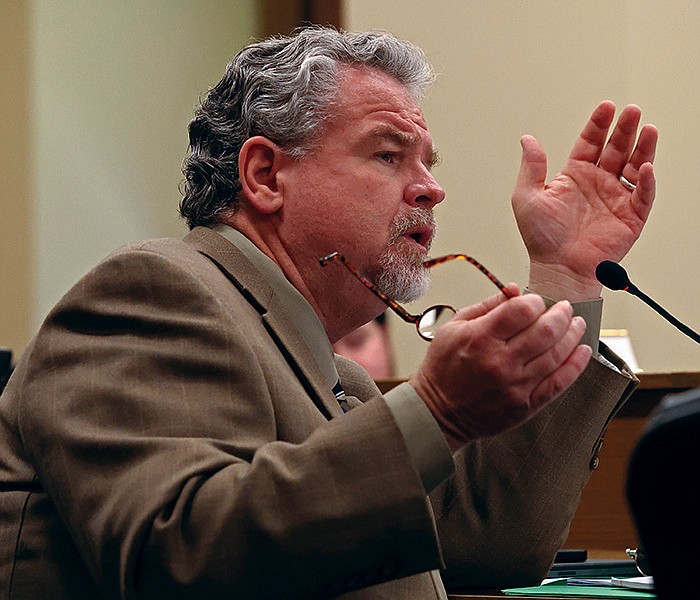A Senate panel on Monday advanced a bill for the second time that would create criminal penalties for knowingly entering and remaining in a bathroom of the opposite sex while a minor is present.
The Judiciary Committee approved Senate Bill 270 by Sen. John Payton, R-Wilburn, in a voice vote with audible dissent. The measure, originally approved by the panel last week, returned to the committee to correct a drafting error. The bill moves to the full Senate for further consideration.
Payton told committee members on Monday his bill is needed to protect minors from "exposure to certain elements of undress by the opposite sex." It also aims to prevent people from entering public changing facilities to observe members of the opposite sex, he said.
The bill would apply to "transgender" and "heterosexual" people, Payton said, and would require a high bar for prosecution.
The legislation would generally criminalize instances where a person 18 or older knowingly "enters into and remains in a public changing facility that is assigned to persons of the opposite sex while knowing a minor of the opposite sex is present in the public changing facility."
The bill defines "public changing facility" as including "without limitation a restroom, bathroom, locker room, or shower room."
A person who violates this section of the code would be guilty of a Class C misdemeanor.
Opponents have said the bill would create the "most extreme bathroom ban" in the nation if enacted. Critics have said the measure could lead to the prosecution of transgender people for using public restrooms while doing little to protect minors from sexual indecency.
Two people spoke against the bill, and no one signed up to speak in favor of it.
Clint Schnekleth, a pastor from Fayetteville, opposed the measure, saying it specifically targets transgender people.
"I'm just asking you, please, would you please stop targeting people," he said, speaking directly to Payton.
Blake Tierney asked lawmakers to listen to the difficulties many transgender people face in their daily lives.
"I urge you please reject this bill. This is not protecting kids," he said. "This bill will undoubtedly be held up in court as many other legislation that has been presented before this legislature has. It will waste precious resources of the state."
Sen. Clarke Tucker, D-Little Rock, who has opposed the bill in committee and on the Senate floor, questioned if prosecutors were aware of any existing laws where "a physical trait of a person's body is an element of the crime to be proved."
Prosecutor Coordinator Bob McMahan said he was unaware of another crime that sets out physical characteristics. He also said he was unaware of any current laws that would criminalize a person solely for entering public property.
Tucker asked how prosecutors would verify a person's sex, which is defined in the bill as "immutable biological sex as objectively determined by anatomy and genetics existing at the time of birth."
Mahan said attorneys could possibly rely on search warrants, subpoenaed medical records and blood tests to gather this information. In some cases, a prosecutor might need to use testimony from an expert witness, he said.
When it comes to determining when a person is found to "remain" in a facility when a minor is present, Mahan said it would depend on the case and the prosecutor's discretion.
Sen. Alan Clark, R-Lonsdale, questioned if any laws exist to prevent people from using bathrooms of the opposite sex. Mahan said he was not aware of statutes that would prohibit this.
"With what people want to be the new norms, we seem to have opened a can of worms," Clark said.
Clark asked if indecent exposure laws would apply in cases where a transgender person uses a shower facility designated for people of the opposite sex. Ginger Kimes, with the Office of the Prosecutor Coordinator, said she would need to know more about the transgender person.
Referring to state laws on indecent exposure and voyeurism, Tucker said physical characteristics are not elements of the crime. These laws address specific conduct and cases where a person has a mental state "for the purpose of sexual arousal or gratification," he said.
When Tucker asked if laws existed to prosecute people who enter bathrooms to harm others, Kimes said there are.
Tucker said he understood the bill would set requirements for facilities owned by private businesses. Payton noted his bill would not apply in private bathrooms that are not designated for a single sex, which would provide business owners with latitude.
Among other exceptions, the bill provides exemptions for parents accompanying minors, people rendering medical assistance, law enforcement officials accompanying a person in their custody and people authorized to maintain and inspect facilities.
